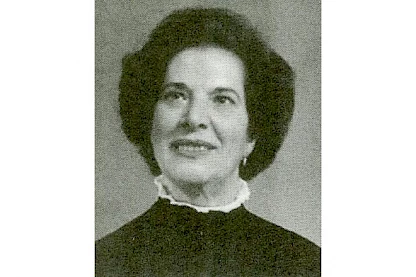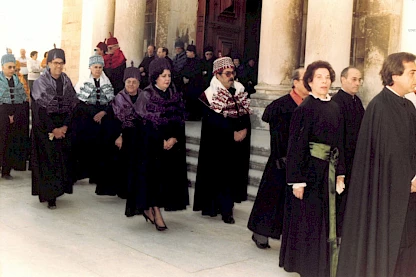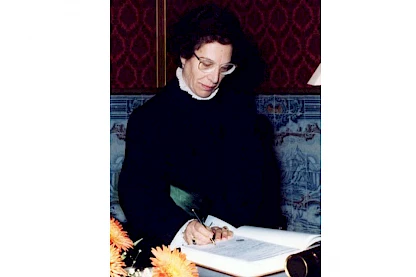Brief Biography
Full Professor at the Faculty of Psychology and Educational Sciences of the University of Coimbra.
She was born on 28 June 1925 in Vila Nova de Poiares, in the district of Coimbra.
She graduated in Historical and Philosophical Sciences (1949) from the Faculty of Arts and Humanities of the University of Coimbra, after which she opted for Psychology.
She worked as a technician at the Experimental Psychology Laboratory and the Phonetics Laboratory of the Faculty of Letters of the University of Coimbra (1952).
She did an internship at the Psychology Laboratory of the University of Milan, Italy (1953-1954) and obtained "Licence" certificates at the Université René Descartes, Paris V, France, with the Rorschach Seminar and the Psychology Seminar (1956).
She was a pioneer in Coimbra in the field of child and adolescent psychological counselling. In this context, she set up and implemented the Mental Health Dispensary, at the invitation of the Psychiatric Centre (1958), where she worked as a part-time psychologist, and also at the Bencanta Institute for the Deaf (until 1982), whose psychology office she developed at the request of Professor Bissaya-Barreto. She also created the Psychology Consultation at the Loreto Centre for the Blind (1969-1970).
As a student of Neurology and Psychiatry at the Psychiatric Clinic of the University of Coimbra, she installed the psychological examination routine at the request of Professor J.A. Correia de Oliveira (October 1954 to June 1960).
She obtained her Ph. D in Human Sciences – Psychology, from the Psychology Institute of the University of São Paulo, Brazil in 1972, with a thesis "Dyslexia-Dysorthography: Psychopedagogical research in primary school" (thesis published in 1974 by Coimbra Editora).
She was an assistant lecturer at the Faculty of Arts and Humanities of the University of Coimbra (1972), having taught practical classes in different curricular units, including School Psychology and Mental Measures.
After the 25 April Revolution, she took part in the creation of courses in the Psychology sub-speciality of the degree in Philosophy, teaching the subjects of School Learning Disorders, Psychopedagogy of Disabled Children and Methods of Psychological Examination and Psychodiagnosis.
From the 1976-1977 academic year onwards, she pursued her academic career at the Course of Psychology, which was transformed into the Faculty of Psychology and Educational Sciences in 1980.
She applied to take the public aggregation exams in 1979 and was appointed to the position of Associate Professor with Aggregation at the Faculty of Arts and Humanities. She applied for the position and was nominated and promoted to Full Professor of Psychology in 1983.
During the Psychology Course, and then in the Psychology Degree (and the Pedagogical Psychology Master's Degree), she introduced and taught different courses in different Study Plans: Introduction to Methods of Psychological Observation and Methods of Psychological Observation (later grouped into an annual course of Methods of Psychological Observation and Assessment); Psychopedagogy of the Disabled; Psychopedagogy of the Handicapped (later called Psychopedagogy of Handicapped Children and Young People); Seminar on Rehabilitation of the Disabled (later called Seminar on Psychological Assessment, Counselling and Rehabilitation); Curricular Internship in Infant Mental Health, Development and Rehabilitation (later called Internship in Psychological Assessment, Counselling and Rehabilitation), in the context of the creation of two areas of study, with access to the respective doctoral degrees: "Psychological Assessment" and "Defectology and Rehabilitation".
The Defectology Service was created in 1981 and approved by the Ministry of Education in 1982. In 1983 the name was changed to the Psychological Assessment, Defectology and Rehabilitation Service, and from 1995 onwards it was called the Psychological Assessment Service.
As part of these services' activities, she edited several publications in the area of psychological tests (e.g. Rorschach, TAT, MMPI, WAIS), which at the time were very useful documents for teaching and professional practice in psychology (see Professor Aura Montenegro's publications in the area of Psychological Assessment).
At the Psychopedagogy Centre of the University of Coimbra (a unit funded by INIC/JNICT), she was responsible for the research line "Psychological Assessment: Study of some instruments" (1987-1994).
She supervised the doctoral theses of 3 members of the current PsyAssessmentLab: Mário R. Simões, Cristina P. Albuquerque, Marcelino Pereira.
She ended her teaching activities at FPCE-UC in October 1995 (due to age limit).
She died in Coimbra on 23 May 2020, aged 94.
Publications by Professor Aura Montenegro (in the field of Psychological Assessment)
- Montenegro, A. (1955). A interpretação psicanalítica do desenho infantil. Objecções à técnica de um caso [The psychoanalytic interpretation of children's drawings. Objections to the technique of a case]. Boletim do Instituto de Orientação Profissional, 1, 101-116.
- Montenegro, A. (1956). O diagnóstico de nível mental a partir do desenho Alguns problemas [The diagnosis of mental level based on drawing. Some problems]. Biblos, 32, 431-472.
- Montenegro, A. (1958). O teste “Tsedek” utilizado como estímulo num estudo de Psicologia Diferencial. Aplicação a estudantes dos dois sexos [The "Tsedek" test used as a stimulus in a Differential Psychology study. Administration to students of both sexes]. Boletim do Instituto de Orientação Profissional, 4(4), 111-148.
- Montenegro, A. (1962). Problemas genéricos relativos à exploração do nível mental através de técnicas psicométricas [Generic problems relating to the exploration of mental level through psychometric techniques]. Boletim do Instituto de Orientação Profissional, 4.ª Série, 63-72.
- Montenegro, A. (1963). Subsídio para o estudo do comportamento de crianças de idade pré-escolar na reacção ao psicodiagnóstico de Rorschach [A subsidy for the study of the behaviour of pre-school children in reaction to the Rorschach psychodiagnosis]. Revista de Psicologia Normal e Patológica, 1-2, 26-37.
- Montenegro, A. (1963). O meio interferente no desenvolvimento e caracterização mental. Notas de observação psicológica [The interfering environment in mental development and characterisation. Psychological observation notes]. Revista de Psicologia Normal e Patológica, 9(3-4), 403-410.
- Montenegro, A. (1966). Considérations à propos du Rorschach d’enfants portugais comparé avec d’autres méthodes projectives [Considerations concerning the Rorschach of Portuguese children compared with other projective methods]. Bulletin de la Societé Rorschach et des Méthodes Projectives, Nouvelle Série, 1, 37-42.
- Montenegro, A. (1976). Testologia (Ciência dos testes). Algumas linhas de interesse [Testology (science of testing). Some lines of interest]. Revista Portuguesa de Pedagogia, 10, 191-201.
- Montenegro, A. (1987). O sistema de cotação integrativa do teste de Rorschach de A. Burstein e S. Loucks. Reportório dos símbolos na adaptação portuguesa [The integrative scoring system of the Rorschach test by A. Burstein and S. Loucks. Symbol repertoire in the Portuguese adaptation]. Revista Portuguesa de Pedagogia, 21, 103-117.
- Montenegro, A. (1989). Projective techniques and clinical assessment. A special case. Psicologia Clínica, 2, 33-45.
- Montenegro, A. (1992). Foreign tests standardized in Portugal in the last three decades. An overview. Psychologica, 8, 185-193.
Support Texts Collection (Psychological Assessment Service editions)
- Montenegro, A. (1982). Normas de avaliação: Teste de desenho da figura humana de F. Goodenough. (Adaptação) [Assessment norms: F. Goodenough Human Figure Drawing Test (Adaptation)]. Edição do Serviço de Avaliação Psicológica. Faculdade de Psicologia e de Ciências da Educação da Universidade de Coimbra.
- Montenegro, A. (1982). Normas de avaliação: Desenho da figura humana na técnica de Machover, por O.L. van Kolck. (Adaptação) [Assessment norms: Drawing the human figure in Machover's technique, by O.L. van Kolck. (Adaptation)]. Edição do Serviço de Avaliação Psicológica. Faculdade de Psicologia e de Ciências da Educação da Universidade de Coimbra.
- Montenegro, A. & Caetano, O.F. (1982). Testes ABC Lourenço Filho: Avaliação da maturidade para a leitura e a escrita [Lourenço Filho ABC Tests: Assessment of reading and writing maturity]. Edição do Serviço de Avaliação Psicológica. Faculdade de Psicologia e de Ciências da Educação da Universidade de Coimbra.
- Montenegro, A., & Simões, M. R. (1982). O método das fábulas de L. Düss em consulta psicológica infantil e juvenil [L. Düss' method of fables in child and adolescent counselling]. Edição do Serviço de Avaliação Psicológica. Faculdade de Psicologia e de Ciências da Educação da Universidade de Coimbra.
- Montenegro, A. (1982). Teste de Apercepção Temática (TAT). Fundamentos teóricos e análise clássica dum protocolo [Thematic Apperception Test (TAT). Theoretical foundations and classic protocol analysis]. Edição do Serviço de Avaliação Psicológica. Faculdade de Psicologia e de Ciências da Educação da Universidade de Coimbra.
- Montenegro, A. (1982). Inventário Multifásico de Personalidade de Minnesota (MMPI). Tradução e adaptação [Minnesota Multiphasic Personality Inventory (MMPI). Translation and adaptation]. Edição do Serviço de Avaliação Psicológica. Faculdade de Psicologia e de Ciências da Educação da Universidade de Coimbra.
- Montenegro, A. (1983). Manual abreviado da Escala de Inteligência de Wechsler para Adultos (WAIS) (Adaptação) [Abbreviated Manual of the Wechsler Adult Intelligence Scale (WAIS) (Adaptation)]. Edição do Serviço de Avaliação Psicológica. Faculdade de Psicologia e de Ciências da Educação da Universidade de Coimbra.
- Montenegro, A., Graça Pinheiro, M. (1984). Manual para cotação integrativa do teste de Rorschach. Sistema Burstein Loucks (Tradução e adaptação) [Manual for the integrative scoring of the Rorschach test. Burstein Loucks System (Translation and adaptation)]. Edição do Serviço de Avaliação Psicológica. Faculdade de Psicologia e de Ciências da Educação da Universidade de Coimbra.



